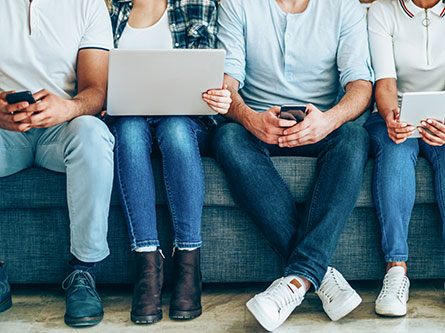For many of us, checking Instagram, Facebook, TikTok and other social media is a part of our normal routine. In 2023, there was an estimated 4.9 billion social media users worldwide. The average person spends 145 minutes on social media every day.
Viewing posts from friends and family across the world can be a way to make you feel more connected. However, social media use has a dark side.
Social media can negatively impact our overall wellbeing by fueling anxiety, depression, loneliness and FOMO (fear or missing out). These issues are especially prevalent in teens and young adults.
Social media is here to stay and will continue to evolve and become more invasive. If you're spending a lot of time on social media and feeling sadness, dissatisfaction, frustration, or loneliness, it may be time to re-examine your relationship with your online presence.
Understanding how social media impacts our mental health and overall wellbeing is important for yourself and your loved ones.
Sign up for our Health Highlights e-newsletter
Mental health impacts
Social media use may increase feelings of anxiety and depression, specifically in teens and young adults.
The addictive nature of social media activates the brain's reward center by releasing dopamine. This is a "feel-good chemical" linked to pleasurable activities. When we post something, our friends and family can "like" it, giving us a boost of dopamine. However, when we don't get that boost or approval, it can impact our sense of self and adequacy.
Filters: Social media heavily focuses on physical appearance. Many social media platforms – such as Snapchat, Instagram, and TikTok – provide users with the option to use filters on an image. Filters can be great for a laugh, but the ability to easily alter physical appearance and hide imperfections can create false illusions. Constant exposure to altered images can also lead you to feel self-conscious and dislike the way you look.
FOMO (Fear of Missing Out): The use of social media increases feelings of FOMO for many people. Checking in on your friends and family through social media may make you feel that others are having more fun or living better lives than you are.
Social media is often called a "highlight reel," displaying the best parts of a user's life. However, having access to other's highlight reels can increase our own feelings of dissatisfaction with our own day-to-day. This can impact self-esteem, trigger anxiety, and make us want to use social media more. FOMO can also compel users to constantly check social media so that they don't miss out on what's happening.
Cyberbullying: In 2020, 44% of all internet users in the U.S. said they have experienced online harassment. Cyberbullying is when someone repeatedly and intentionally harasses, mistreats, or makes fun of another person by way of an electronic device. It can severely impact self-esteem and mental health. Social media platforms can be hotspots for cyberbullying and spreading hurtful rumors, lies, and abuse that can leave lasting emotional scars.
Learn the symptoms of anxiety and how to know when you need help
Ways to safely use social media
A great way to improve your relationship with social media and help decrease the negative effects is to decrease your daily screen time. Tips to decrease screen time include:
- Set time limits on social media apps within your phone settings
- Designate specific hours for social media usage
- Look through your friends and followers list and unfriend people whose accounts make you feel bad about yourself
Explore how to set boundaries and why it matters for your mental health
Find fulfillment and happiness outside of social media
Prioritize in-person connections and activities to help improve your mental health. This can also lead to decreased screen time.
Find activities that fulfill you outside of your phone. Hiking, picnics with friends, painting, pickleball, reading, or walking your dog can be great ways to connect with others. Activities you enjoy can also improve your physical and mental health.
See 3 ways getting outside into nature helps improve your health
A positive relationship with social media is personal to you. Take time to evaluate your social media use and how it affects you. Taking any steps to limit screen time or improve your relationship with your phone can positively impact your mental health.
It can be hard to know when to contact a professional. If you or a loved one are severely struggling with mental health issues, contact your primary care provider to discuss treatments for anxiety, depression, or other issues.
What is primary care? Learn why you should partner with a provider for your health
This blog was medically reviewed by Dawn Bounds, Ph.D., a fellow in the Betty Irene Moore Fellowship for Nurse Leaders and Innovators.




